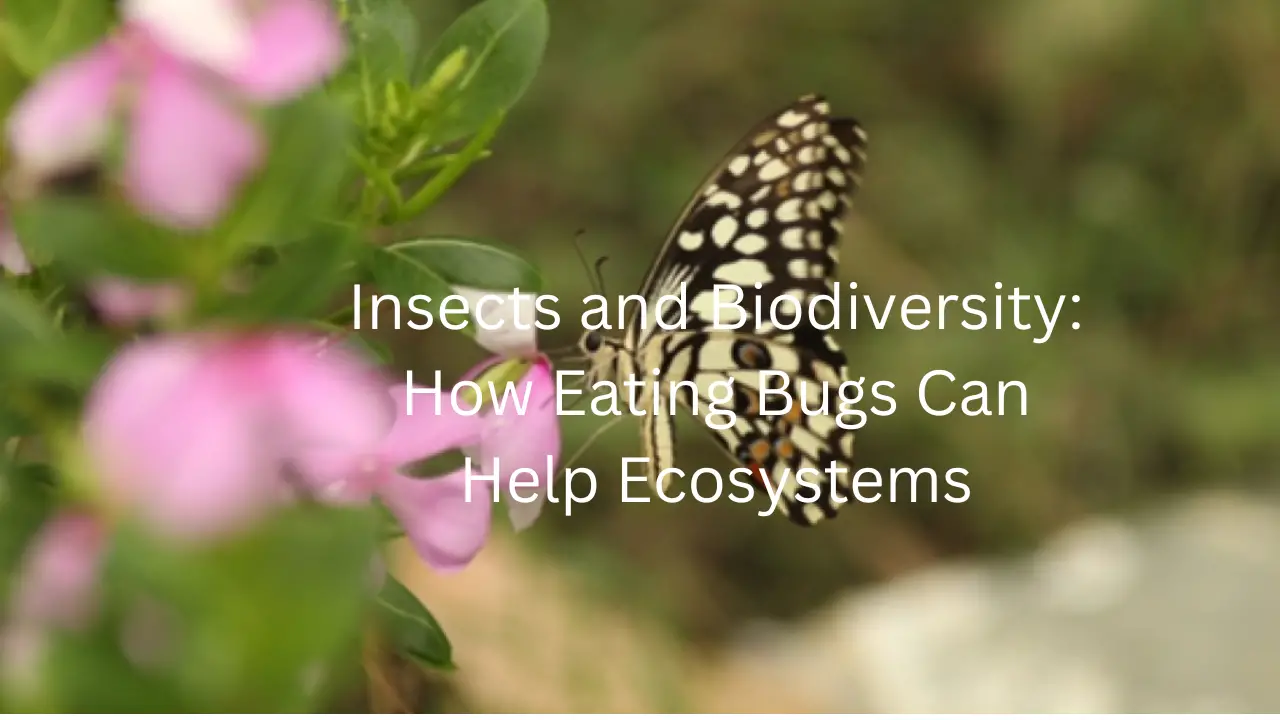
Thermacell Mosquito Repellent E-Series Rechargeable Repeller; Patio Shield 20’ Mosquito Protection Zone; includes 12-Hr Repellent Refill; No Flame or Scent; Bug Spray and Bug Zapper Alternative
27% OffInsects and Biodiversity: How Eating Bugs Can Help Ecosystems
In our quest to explore alternative sources of sustenance and address ecological concerns, a peculiar but promising trend has emerged – entomophagy, the consumption of insects. While the idea of chomping down on bugs may sound strange, it’s not just a quirky culinary adventure; it holds the potential to revolutionize our approach to food sustainability and ecosystem health.
Introduction
The world of insects is vast and astonishingly diverse, with over a million identified species and possibly millions more yet to be discovered. These tiny creatures play a pivotal role in maintaining the delicate balance of ecosystems worldwide. From nutrient cycling to pest control and pollination, insects are ecological linchpins.
Insect Biodiversity
The Vast World of Insects
Insects come in all shapes and sizes, from the fluttering butterflies that grace our gardens to the industrious ants toiling underground. This diversity is a testament to their adaptability and resilience in a wide range of environments.
How Insects Contribute to Biodiversity
Insects are essential components of food chains and webs, providing sustenance for numerous other species. Their diverse diets and interactions with plants and animals help create the rich tapestry of life we call biodiversity.
The Bug Eating Trend
The Rise of Entomophagy
Entomophagy, the practice of eating insects, is not new. It has been part of the diets of various cultures for centuries. However, in recent years, it has gained considerable traction in Western societies as a sustainable food source.
Culinary Delights from Insects
From cricket tacos to mealworm protein bars, innovative chefs and food entrepreneurs are creating delectable dishes and snacks from insects, challenging our culinary perceptions.
Benefits for Ecosystems
Role of Insects in Nutrient Cycling
Insects are the unsung heroes of nutrient cycling. They break down organic matter, converting it into nutrients that plants can use, thereby enriching the soil. This process is crucial for maintaining fertile ecosystems.
Pest Control and Pollination
Insects also serve as natural pest controllers and pollinators. Ladybugs, for example, feast on aphids, protecting crops without the need for harmful pesticides. Bees, another vital insect group, facilitate the reproduction of countless plant species through pollination.
Sustainable Protein Source
Insects as a Protein-Rich Food
Insects are protein powerhouses. They often contain as much, if not more, protein per gram than traditional livestock like cattle or poultry. This protein can be a vital resource in addressing global food security.
Environmentally Friendly Protein
Compared to traditional livestock, insect farming is remarkably eco-friendly. It requires significantly less land, water, and feed, and generates fewer greenhouse gas emissions. It’s a sustainable solution for a planet burdened by the environmental impact of conventional meat production.
Overcoming Hesitations
Addressing Concerns about Eating Bugs
The idea of consuming insects can be off-putting to many due to cultural taboos or fear of the unknown. However, with proper education and the right culinary approach, these concerns can be overcome.
Delicious Insect Recipes
From cricket flour for baking to roasted grasshoppers with a hint of spice, there’s a world of delicious insect-based recipes waiting to be explored. These culinary adventures can help bridge the gap between hesitancy and enthusiasm.
The Future of Bug Cuisine
Growing Popularity
As more people become aware of the benefits of insect consumption, the popularity of bug cuisine is on the rise. Restaurants, food startups, and even home cooks are incorporating insects into their menus.
Potential Impact on Ecosystems
The growing trend of entomophagy could have a positive ripple effect on ecosystems. Increased demand for insect farming could promote the conservation of insect species and their habitats, contributing to the preservation of biodiversity.
Conclusion
In conclusion, insects are not just creepy-crawlies to be swatted away; they are vital contributors to the intricate web of life on Earth. Embracing the practice of entomophagy offers us a unique opportunity to support biodiversity, address food security challenges, and reduce the environmental footprint of our food choices. So, the next time you contemplate trying a cricket protein shake or a mealworm stir-fry, remember that you’re not only indulging in a culinary adventure but also taking a step towards a more sustainable and ecologically sound future.
FAQs about Eating Insects for Ecosystems
1. Are all insects safe to eat?
- While most insects are safe for consumption, it’s essential to source them from reputable suppliers to ensure they are free from contaminants.
2. How can I start incorporating insects into my diet?
- You can begin by trying insect-based products like protein bars or cricket flour, or experimenting with insect recipes available online.
3. Do insects taste good?
- Insects have a unique flavor profile, often described as nutty or earthy. Their taste can vary depending on the species and preparation method.
4. Are there any health benefits to eating insects?
- Insects are a rich source of protein, vitamins, and minerals. They can be a healthy addition to your diet.
5. Is eating insects really better for the environment?
- Yes, insect farming has a significantly lower environmental impact compared to traditional livestock farming, making it a more sustainable option for protein production.











